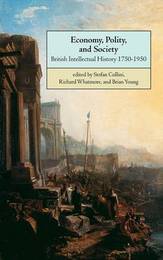
|
Economy, Polity, and Society: British Intellectual History 1750-1950
Hardback
Main Details
| Title |
Economy, Polity, and Society: British Intellectual History 1750-1950
|
| Authors and Contributors |
Edited by Stefan Collini
|
|
Edited by Richard Whatmore
|
|
Edited by Brian Young
|
| Physical Properties |
| Format:Hardback | | Pages:292 | | Dimensions(mm): Height 229,Width 152 |
|
| Category/Genre | Economics |
|---|
| ISBN/Barcode |
9780521630184
|
| Classifications | Dewey:330.941 |
|---|
| Audience | | Professional & Vocational | |
|---|
|
Publishing Details |
| Publisher |
Cambridge University Press
|
| Imprint |
Cambridge University Press
|
| Publication Date |
8 May 2000 |
| Publication Country |
United Kingdom
|
Description
Economy, Polity, and Society and its companion volume History, Religion, and Culture bring together major new essays on British intellectual history by many of the leading scholars of the period, continuing a mode of enquiry for which Donald Winch and John Burrow have been widely celebrated. This volume addresses aspects of the eighteenth-century attempt, particularly in the work of Adam Smith, to come to grips with the nature of 'commercial society' and its distinctive notions of the self, of political liberty, and of economic progress. It then explores the adaptations of and responses to the Enlightenment legacy in the work of such early nineteenth-century figures as Jeremy Bentham, Tom Paine and Maria Edgeworth. Finally, in discussions which range up to the middle of the twentieth century, the volume examines particularly telling examples of the conflict between economic thinking and moral values.
Reviews'... a remarkable collection of talented historians whose enthusiasm for their subject cannot help but assist in revivifying a field still much in need of due recognition.' History of Political Thought '... the authors contributing to this volume have an extremely deep, detailed and subtly nuanced understanding of their subject matter; the volume is a monument to scholarship in the best sense of that term ... All British intellectual historians must buy and engage with this book. Indeed, anyone involved in the study of nineteenth-century Britain would do well to read it as a corrective to the misconceptions and generalizations that occur in so many standard texts. For the eager undergraduate the book provides many examples of historical investigation of the highest quality, real benchmarks to measure aspirations against.' Cromhos
|